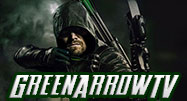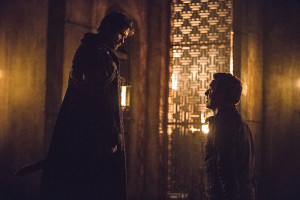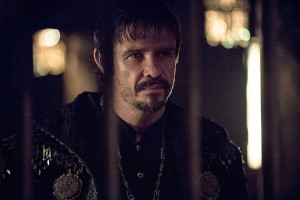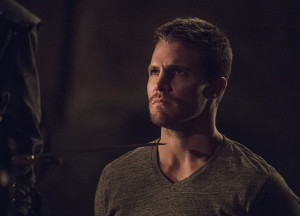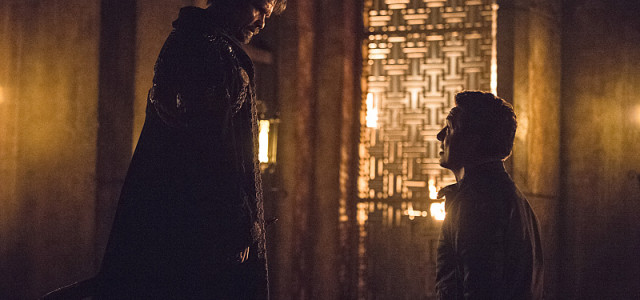
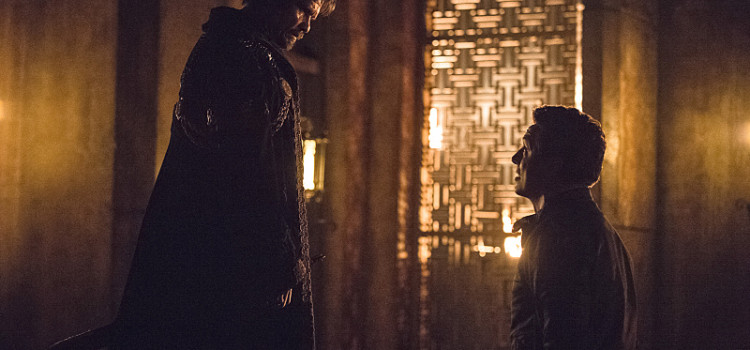
Arrow #3.15: “Nanda Parbat” Recap & Review
Recaps & Reviews March 5, 2015 Matt Tucker

Summary: Stuttering pacing doesn’t detract from a solid series of resolutions that spin out new questions, including a perplexing offer of a cliffhanger.
If you have not seen this episode yet and do not wish to be spoiled, do not continue reading!
Recap
Nyssa informs her father that Oliver Queen is alive and back in Starling City, to which he acknowledges he already knew. Ra’s also tells her he knows Oliver didn’t kill Sara. When she accuses him of not giving her justice because he never approved of her relationship with Sara, Ra’s tells her that he didn’t approve of Sara because he knew she’d eventually leave. Nyssa tells him she will kill Oliver for having challenged him and not dying earlier.
Thea and Oliver train with Malcolm in the foundry. Thea has temporarily closed Verdant, and Diggle has used ARGUS technology to seal everything like a fortress. Malcolm insists Oliver and Thea stay there, but Oliver tells him they’ve chosen to live at the loft apartment. Thea and Laurel briefly talk and her guilt over killing Sara really bothers her. She talks with Roy, who admits knowing she killed Sara. He relays his story about killing the cop while injected with Mirakuru and his guilt.
Felicity is worried about Ray Palmer because he’s been obsessively working on the A.T.O.M. suit for a week with no contact.
Thea tells Laurel that she killed Sara under Malcolm’s influence. Laurel understands but doesn’t get why they would work with Malcolm. She tells Thea that she has a choice, even if she feels like she doesn’t. Laurel speaks to Oliver and tells him she can’t remember her sister’s smile. She says finding her killer will help and Oliver promises they will. She calls him on lying to her about the truth about Thea and that she can’t believe he keeps protecting Malcolm.
Oliver confronts Thea about telling Laurel and discovers that Thea told the League where to find Malcolm. Laurel attacks Malcolm as the Canary and holds him at gunpoint. Nyssa and her assassins arrive and capture him. Oliver yells at Laurel at the foundry for confronting Malcolm and tells everyone that they have rescue him. Felicity objects at first but tracks Malcolm down to a helipad. Oliver goes to stop them and fights Nyssa, but her goons fly Malcolm away.
Oliver holds Nyssa captive to find Nanda Parbat. Everyone objects to Oliver torturing Nyssa for information. He doesn’t. He knows that she’ll tell him so that he can go lose his life to Ra’s. Oliver doesn’t want Thea to have to deal with the guilt of getting her father killed. The others try to convince him otherwise, to no avail. Diggle thinks there is something else behind Oliver’s intent.
Ray is locked out of the A.T.O.M. systems on the Palmer servers by Felicity. She tells him she will let him back in if he eats, takes a shower, and gets some sleep. He agrees. Diggle talks to Lyla about Oliver going to Nanda Parbat. She convinces him that he has to go with Oliver. They use an ARGUS jet to fly to Asia. Malcolm is brought before Ra’s and begs for his life. He’s has no mercy to give.
Laurel and Nyssa talk about Sara, and Nyssa recounts the story of the first time she heard her laugh and fell in love with her then. Felicity and Ray share a moment and kiss. They fall into bed together. Ray wakes up later with a thought of the last piece he needs to get the A.T.O.M. suit to work.
Oliver and Diggle arrive outside the Nanda Parbat temple stronghold. They are discovered but fight their way in. Oliver uses a tracker to locate Malcolm, who is tortured and strung up. Malcolm mumbles that it’s a trap and gates close around them. Oliver and Diggle are chained to the floor in a cell. Oliver admits that part of coming after Malcolm is because he hates that Ra’s al Ghul beat him. Diggle tells Oliver he and Lyla are getting remarried. He asks Oliver to be his best man. Maseo arrives to take Oliver to his fate.
Roy takes Thea to see the family of the cop he killed. He tells her that he secretly sends them money, groceries, and toys. He says that it helps with the guilt. Thea is worried that she is a killer like Malcolm is because she turned him over to the League. Later, she frees Nyssa and tells her that she was the one who actually killed Sara. She asks Nyssa to take her life for justice.
Ray finishes and activates the A.T.O.M. suit. He puts it on and steps to the roof of Palmer Technologies. He fires up the suit and flies into the night sky. In Nanda Parbat, Oliver is brought before Ra’s. He expects to be killed and asks for Diggle’s life to be spared. Ra’s tells him that he doesn’t intend to kill him; he has another idea. He makes Oliver an offer to become the next Ra’s al Ghul.
In the flashbacks, Oliver is debriefed in China. Shrieve informs him that Waller is no longer on the Omega case and the Oliver is free to leave. As Oliver and the Yamashiros prepare to leave on a boat, they are ambushed by what they believe to be ARGUS assassins. In the end, Oliver takes their son to escape, and Maseo and Tatsu are left at the docks.
Review
If ever there was a concern that Arrow borrows a bit liberally from the Batman mythos, this episode would certainly not be one to present to people to quell that talk.
Continuing to play on the overarching season theme of identity, the show pilfers wholesale from its Dark Knight cousin the defining aspect of the character of Ra’s al Ghul. Flush with daughters, Ra’s wanted an appropriate heir, not of blood but of ability and worldview, to take over his mantle and his cause. (Ra’s had one known son, Dusan, who as an albino was thought unworthy of his father’s domain.) The “Detective” was his chosen one, just as Oliver Queen proves to be here.
This Ra’s persists as a bit of a hodgepodge of all that have come before him. While the comics and animation have certainly hinted at Ra’s al Ghul being a nom de guerre and not the character’s birthname, here they take a page from Nolan’s version in proffering that The Demon’s Head is a title passed down to successors. This was seen as a realistic way to portray the idea that Ra’s has lived a supernaturally extended life, and to a degree, that suggested here, as well.
In many ways that hodgepodge works, and he’s enigmatic enough to keep us engaged. It’s clear they are having fun with the concept, swimming in all of the ornate accoutrement that dares to be outlandish in live-action. It passes muster because, while they aren’t afraid to pay some camera time to it, they generally just accept it. It’s as natural and inhabited as Matt Nable’s eerily reserved take on the role. Ceremonial as the ages-old customs of the League of Assassins, giving it credence akin to other Southeast Asian cultures. Opening on Ra’s serenely marinating in a hot spring meant to evoke the infamous Lazarus Pits is but another sly, geeky nod.
(Does the pit actually work, as some of the dialogue this season seems to suggest?)
Yet, it’s that reservation that’s a bit tough. Where Ra’s should feel like a creeping menace threatening to suffocate everything in Oliver’s world, threatening to bleed into every crevasse in a way that gives Oliver nowhere to go, there is but hollowness instead. The gravitas is robbed because Ra’s is ill-defined, a notable threat whenever we see him but as weightless as fog when he’s not around. Whether an intentional stab at mysterious or an unfortunate by-product of the story breaks, the character is underserved. The fault lies not in Nable, who brings a world-weary charisma any time he’s on-screen like in his resolute yet wistful condemnation of the captured Malcolm Merlyn, but in the writing and plotting of the man he’s tasked to play.
So, when Ra’s presents Oliver with his offer, it’s a fine twist. A genuine surprise because nothing on the show this season really anticipated it, even if it’s ultimately not a shocking turn given the character’s source material. It’s also a decent cliffhanger for the spring hiatus, leaving us with enough of a question to spin off into the final act of the season. But therein lies part of the problem. It’s already the last third of the season and the same dire urgency that floated both of the previous seasons to their respective ends has yet to really surface. As the Perhaps his attempts to groom Oliver to be his successor, if Oliver so chooses, will have weight and definition to provide thrust and consequence, but the offer lacks the true impact that it should have made, both in the surprise and in the temptation for Oliver to take him up on it.
Oliver has, sadly, felt as much of a blank slate this season. To a degree, that actually plays into his arc, searching for identity outside of the Arrow persona. When you’ve dealt with physical and mental ability, going existential is a fair next journey. It’s one that needs more than a college try at commitment, though, because you’re tapping into the aspect of man that can make or break his spirit. The Arrow is an external focus with both clear goals and clear challenges. Oliver can suffer a defeat on that realm because it is tangible enough for him to visualize a response, to plan for a comeback, even if the path initially eludes him. It’s something he’s done with Malcolm, with Slade, and turns out to be one of his key motivations in rescuing Malcolm from Nanda Parbat. It burns him to his core that he lost to Ra’s, and that fire fuels his foolhardy mission as much, and seemingly more, than any attempt at saving his sister’s soul from her brash decision to turn her father over to the League.
When dealing with existence and the spirit, it’s far more nebulous. A crisis that forces one to re-examine their life, their very purpose, is a scattered journey that often isn’t dealt with in a linear, progressive fashion. It can cause a lot of stumbling around, and often people can be left listless for years, if not for life. It’s tougher to identify what needs to be addressed aside from general feelings of desire and an overwhelming sense of lack. The dramatically uneasy ground is full of much potential, but it’s far too easy to get lost. That’s been the challenge of Oliver’s journey this year.
It’s not that the audience can’t place what they are doing with him, more that he’s felt rather inert most of the year. There just isn’t a tangible ring for him to grab. The hardships seem less immediate and less involving for the audience, the stakes not as precise. The result is that, once presented with Ra’s offer to take his place, what should be a defining moment in his life is undercut. We obviously have yet to see how he responds, but the offer’s appeal to Oliver’s wayward soul should be so great, so tempting that the audience is genuinely concerned that he could take it. It’s a nice little sting at the end of the episode but any waffling or serious pondering doesn’t feel earned to this point.
That still doesn’t draw the nice reversal of expectations with Malcolm playing trap bait as well as victim. Aside from the missing gutpunch of the offer, everything in Nanda Parbat was handled quite nicely.
As was Thea’s reveal to Laurel. Why I still get surprised at how quickly Arrow can kill proto-sacred cows is beyond me, yet once again I’m astonished by the decision on Thea’s part to just come right out and tell Laurel the truth about killing Sara. Thea is quickly proving to be the most decisive character on the show. It was just last episode that Thea learned the truth herself and told her father that she could fight with them to end the threat to their lives but she’ll never honor that family bond again. It didn’t take long for that guilt to eat away at her, and it’s refreshing to see someone actually address an issue right away. They even make the point with Oliver continuing to lie to Laurel about Sara’s killer and her calling him on it. Thea’s relevance as a character is still in question, but she doesn’t beat around the bush. That’s highly admirable.
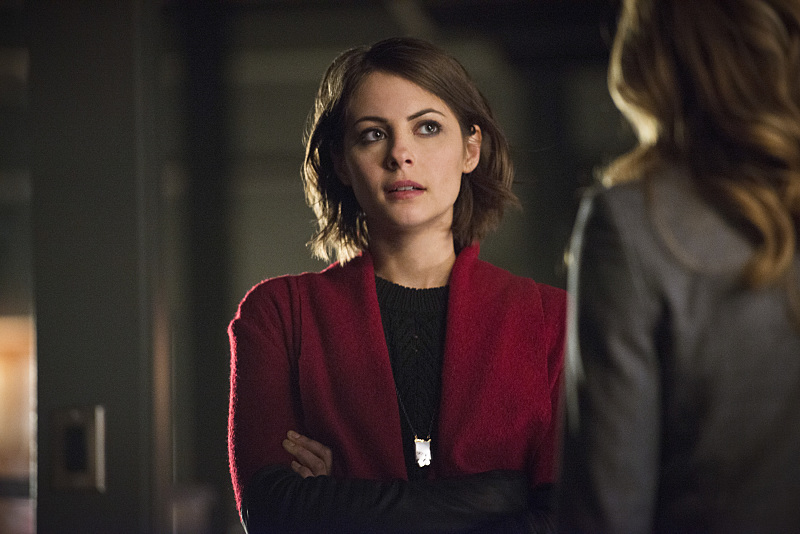
Unless, of course, she makes gut decisions without fully thinking everything through, like turning Malcolm over to the League or offering Nyssa the chance to kill her. One has to enjoy the balance in having Roy help coach Thea through what she is feeling. The resident hothead offering advice on how to cope and how to repent for a sin over which they had no control. Roy helping out the family of the cop he killed last year was a nice touch, and also feels rooted in the character from his first days on the series. He’s a good-hearted person, but in an odd way, he bears some responsibility in both of Thea’s drastic choices. Ultimately, it’s all on her, but Roy was the one to advise her to tell Malcolm to take a walk, and sharing with Thea his good deeds seemed to make her feel that she was too cold of a person to keep on living. Maybe not so much with the trying to help out your ex, Roy.
That’s not to say that Nyssa is going to take Thea’s life. She’s just as fiery as bullheaded as both of the younger crew, but she’ll recognize that Malcolm was her one true goal.
As rash and unswerving as Nyssa can be, her captivity this episode gives us a chance to peek into her humanity, which is always a treat. The exchange between she and Laurel was a lovely moment. Given the year of hell she’d just gone through on the island, as well as being washed out to sea to die for the second time, it’s a bit hard to imagine Sara laughing at whatever fearful demonstration Ra’s put on for her. That said, it’s a lovely thought, and it was touching to give that beat to both women.
Laurel fared far better in that than she did as Canary this time out. Of course, she was going to chase down Malcolm. Of course, he was gonna sidestep her attacks like little master Chiun making an ass of Remo Williams. Of course, there was gonna be a smug dismissal of not just Laurel’s chosen path but of her as person. I’m steadfast in my belief that showing Laurel’s growing pains as a hero is both the best approach and a more honest portrayal that maintains an authenticity of the show. The inconsistency of Laurel’s abilities is a bit of an issue.
She didn’t look quite so much overmatched by Malcolm, which by the nature of his training and experience is surely the case, as much as she looked incompetent. Some of that can be owed to her emotional state; as we’ve seen in countless shows and movies, fighting on the pure passion of anger is the quickest way to falter. Yet, she looked like she had hardly a lick of training, just a mad woman swinging a club at a guy. One week she can’t appear beyond capable of being out in the field only to come off as a first-timer the next. It feels like writing purely to suit the plot and not genuinely character oriented.
After that performance, though, it’s apparent that Laurel needs far more training. Being out in the field, trial by fire, is one thing. We need to see her being serious about this and progressing if we’re to buy that she should continue to be out there. You have Ted Grant. Use him.
This theme of identity and heroism-driven purpose has played out in two distinct fashions this season, aside from Oliver, through Laurel and Ray Palmer. Both were marked by tragedy to lead them down their paths and both were presented with circumstance for the opportunity to pursue things in the fashion they have, even though there’s quite a gulch between where Laurel has gone and where Ray is going. It’s good that he has been somewhat sidelined the last few weeks because it gives credence to the obsessive quality they traded on this week. That finally pays off, if in more ways than one. It’s curious and interesting that it takes Ray giving into his feelings for Felicity to find the clarity he needs to make the A.T.O.M. suit work, giving his motivation for building it in the first place.
The aggrandizing of Felicity’s importance to the path of heroes — she’s been a catalyzing force for the Arrow, the Flash, Black Canary, and now the Atom — has become a bit of a thorny aspect of the series and the entire DCwU at the moment. Yet, one thing can’t be denied, and it’s that she can still be a bright spot in this increasingly dark world. While I don’t necessarily feel that they have to keep pinning all of that on the romantic, there’s something refreshing in the way characters like Ray and Barry Allen manage to ground Felicity closer to what we all first enjoyed about the character so much. Some want to dismiss Ray as a “stalker,” even though they give a pass to Felicity for doing the same things, and yet it’s very hard to deny that their rapport brightens and livens things up.
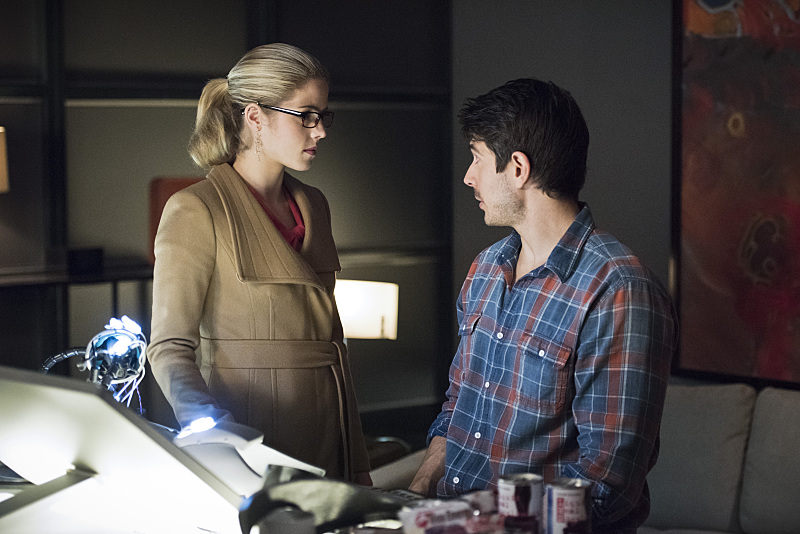
The two giving into their feelings for one another is a great development because it allows for moments of hope. We get to see great love and support between Diggle and Lyla, but with Ray and Felicity we get the humor. We get a lightheartedness that isn’t really found anywhere else in the show. In addition, we get motivation through connection. Sure, Felicity has presented a bit of a roadblock to Ray’s plans, but that’s only been in reaction to how Oliver deals with things. Oliver’s path is one of challenge, one of needing to bust through things head-on to move forward, and it’s sadly created a rather grim and aggressive environment. One simply has to look at the ways those in Team Arrow generally interact with one another nowadays. It’s usually through gritted teeth, accusations, and quarreling. To see, Felicity and Ray connect, and for Ray to come out of that with the clarity he needs to complete his A.T.O.M. project is a breath of fresh air.
Yes, there will be those who will persist in “slut-shaming” Felicity for having gone to bed with Ray. It’s an unfortunate aspect of both fandom and of society in general. This disregards the fact that Ray and Felicity have a history, have acknowledged their attraction to one another, and have a connection built on friendship as well as their professional interaction. This is also the first man she’s been with since she started this crazy crusade. Just because it’s not Oliver Queen is no reason to take that away from her as a person. I could easily get onto my soapbox now about the misguided expectations of women in this society when it comes to dating, relationships, and sex, but it’s not really the place. Felicity is an adult who engaged in a consensual interaction with someone she cares about, and someone who actually cares enough to want to share in each other’s lives in that fashion. Bully for her.
With Ray, we finally get the suit. And the reveal is both astounding, especially for television, and a bit confounding.
In the comics, Ray Palmer is one of the premiere gifted geniuses of the DCU. Yet, he’s not a tech guy, per se. There’s a distinct feeling that what we’re witnessing with Ray Palmer really was a story intended for the character of Ted Kord, the second man to bear the name Blue Beetle. Kord Industries is one of the cutting edge tech companies in the DCU, and Kord’s version of the Blue Beetle was similar to both Green Arrow and Batman in that he relied on technology to help him fight crime. Ray Palmer, on the other hand, was a physicist. That made his alter ego of the Atom far more apropos. As cool as it is to see this marvel of a suit, the main thought I was left with as he took flight were the inescapable cloaks of Ted Kord and one Tony Stark.
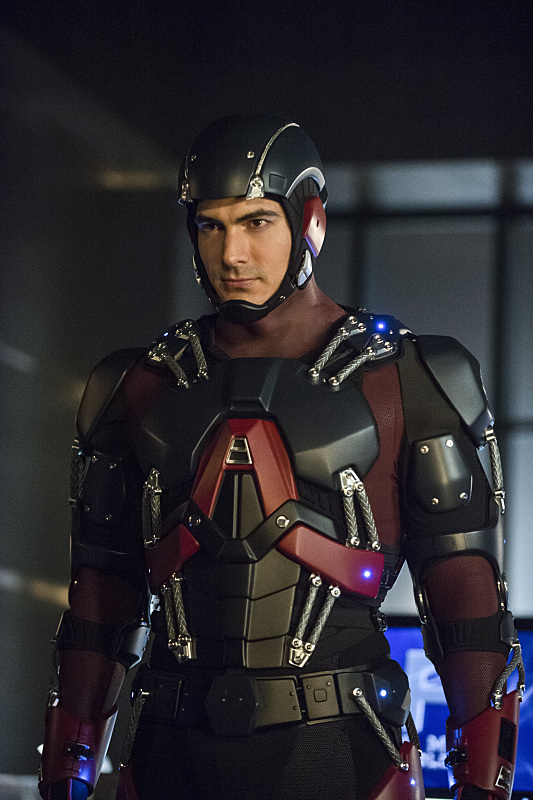
Sure, the Iron Man comparison is a bit obvious, but that’s just it. While their motivations couldn’t be more dissimilar, as are their personalities, it’s hard not to feel that this is a scaled-down play on the current icon of tech-based heroism. It is obvious. There is a great deal of fun to be had, and plenty to geek out about, in the sequence of Ray’s take-off and fly-by with Felicity in bed. (That it was, in a sense, Superman flying again adds a whole other layer to it.) Ray’s approach, while it borders on the science-y aspect that is the niche of The Flash, does open up new and different parts of this ever-burgeoning universe. You can’t fault it for that. Still, one can’t help but feel we’ve seen this before. If they had pushed the whole shrinking ability and this sequence was the first moment Ray is able to do that, it might have made for a more unique moment.
We know Ray has the potential to head off into his own adventures, but what does his being in the suit now bring to Arrow? What does it add to the season heading into the final act? Laurel’s path as toward Black Canary has some bearing on Oliver’s story. Ray’s A.T.O.M. adventure feels a bit too independent, and that drew away from that triumphant moment in the end.
Rewatching the hour, it’s nice to see a number of character moments that build some questions going forward. That’s always a good thing to do both for your final act and heading into a hiatus. On the whole, the episode ends up being solid, as a result. Though, the odd structure of vignettes, particularly between the time Malcolm is captured and when Oliver and Diggle arrive to storm Nanda Parbat, sets a strange pace. Despite the number of issues that have been mentioned above, it was fairly enjoyable to watch through, paid off in great interactions like Lyla insisting Diggle go with Oliver, the Laurel-Nyssa exchange, and Diggle asking Oliver to be his best man. And, of course, despite the Iron Man trappings, Ray flying off of that rooftop in his fully-operational suit was a pure joy. It’s not quite the Atom, at least not yet, but it’s the kind of geeky fun you want in a superhero series.
That’s all pinned up with Ra’s offer. On the surface, it’s a compelling one. Just wish there was more mustard both behind Ra’s and behind Oliver’s identity crisis for it to have provided the cliffhanger they were hoping for.
Odds & Ends
- Diggle is like the butler of a 1930s murder mystery radio drama, seeming to order everyone out of room at many a turn.
- Is Ray’s apartment in the Palmer Technologies/former Queen Consolidated building? Him taking off from the roof seems to suggest it is.
- Have to say that I’m not a fan of Oliver’s mechanical bow. I wasn’t a fan when Smallville‘s Oliver Queen employed something similar. I get why they use it; it’s a melee weapon as much as a ranged weapon now. It can be used in a sorts of fashions for zip and escape lines. And they always want to goose the coolness factor by showing this thing transform from something near palm-sized to a full-fledged compound bow. Yet, there’s an elegance to the simple bows Oliver had before that feels missing. It was also a point of characterization in the comics about Ollie preferring to use simple longbows.
- The bow aside, Oliver using the arrows that the League sentries shot at him to fire back was cool.
- The concern over the windshield-like visor of the A.T.O.M. suit wasn’t fully warranted as it appears Ray can tint the glass dark when he goes into a combat mode.
- It’s odd that Nanda Parbat seems more of a temple or shrine here than a city. Of course, we can just assume “city” in the broad term, as countless settlements carved into faces of mountains throughout various genres have been labeled as such. I guess I was expecting a bit more. Though, if you do want to keep yourself clandestine, their approach makes more sense.
Matt Tucker Editor/Senior Writer/Reviewer
Matt Tucker is a stage and film actor, writer, Seattleite, comics nerd, sports fan, and aspiring person. Someday, he’ll be a real boy. He's an editor and senior writer for KSiteTV network (GreenArrowTV, DaredevilTV) and the sports blogs Sonics Rising and Cascadia Sports Network. Follow him on Twitter at @MattBCTucker or @TuckerOnSports
Arrow Reunion: Calamity Jane Now Available on Tubi
News Jun 17, 2024
Bid on a Piece of Arrow (and Flash) History!
News May 22, 2024
Arrow Season 8 Blu-ray & DVD Coming April 28
News Feb 5, 2020
End of an Arrow: Thoughts on the Series & Finale
News Jan 28, 2020
